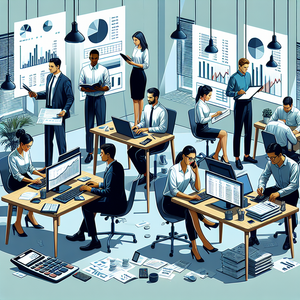
Exploring the Future: 10 Careers Fueled by Lifelong Learning
In a world constantly evolving with new technologies and societal changes, lifelong learning has become essential for success. Unlike traditional education, lifelong learning is an ongoing process of gaining knowledge and skills needed to thrive in today's fast-paced environment. This approach opens up career opportunities, improves problem-solving skills, and strengthens resilience in the face of change. Forward-thinking individuals leverage lifelong learning to excel in their professions, while educators promote a mindset that values curiosity and adaptability. This universal concept is crucial for personal development, career growth, adapting to new technologies, and succeeding in changing job markets. Below, we explore ten careers that embody lifelong learning, showing how they embrace continuous education and adaptability.
Job Summaries:
Lifelong Learning Facilitator:
- Lifelong Learning Facilitators design educational programs for adults and professionals.
- They assess educational needs, create customized curricula, and use engaging teaching methods.
- With a deep understanding of adult learning principles and curriculum development, facilitators often have degrees in education or related fields.
- They are key to fostering a learning culture within organizations, enabling individuals to adapt and thrive in ever-evolving professional environments.
- For instance, by offering workshops on new technologies, they directly connect their work to the idea of lifelong learning.
Educational Technology Specialist:
- Educational Technology Specialists integrate technology into learning environments to improve educational experiences.
- They create digital tools, train educators on tech applications, and support the implementation of online learning platforms.
- This role requires expertise in instructional design and a solid knowledge of the latest educational technologies.
- Specialists, often with backgrounds in educational technology or computer science, make education more accessible and engaging in a tech-centric world.
- By promoting digital literacy, they embody lifelong learning through their ability to continuously adapt to new technological trends.
Corporate Trainer:
- Corporate Trainers develop and deliver training programs that equip employees with the necessary skills and knowledge for their roles.
- They identify training needs, create educational materials, and conduct workshops.
- With degrees in human resources or education and experience in corporate settings, trainers are vital in promoting skill development and continuous learning.
- By helping employees keep up with industry changes, they support personal and professional growth.
- A clear example of lifelong learning in this role is when trainers update their programs to include the latest industry practices.
Career Development Advisor:
- Career Development Advisors help individuals chart their career paths by offering professional development advice, resume building, and job search strategies.
- They assess clients' strengths and interests and connect them with learning resources.
- With backgrounds in psychology, counseling, or human resources, these advisors encourage the pursuit of lifelong learning, advocating for ongoing education to remain competitive in the job market.
- An advisor might, for example, direct a client towards additional certifications that align with new job trends.
Innovation Manager:
- Innovation Managers lead efforts to drive creativity and ongoing improvement within organizations.
- They identify opportunities for innovation, facilitate brainstorming sessions, and oversee projects that support business growth.
- This role requires strategic thinking and project management skills, often supported by backgrounds in business or engineering.
- By fostering a culture of exploration and learning, Innovation Managers incorporate lifelong learning into organizational strategies, helping companies stay flexible and responsive to market changes, as seen in their promotion of cross-departmental collaboration.
Instructional Designer:
- Instructional Designers create educational materials and experiences to boost learning and retention.
- They work with subject matter experts to develop course content, design interactive modules, and evaluate program effectiveness.
- With expertise in learning theories and educational technology, instructional designers typically hold degrees in instructional design or education.
- They support lifelong learning by crafting engaging educational experiences, ensuring content evolves with learners' needs, such as incorporating feedback to improve course offerings.
E-Learning Developer:
- E-Learning Developers create online courses and platforms using multimedia tools to build interactive content.
- Technical skills in web development and knowledge of e-learning software are essential for this role.
- Often with backgrounds in computer science or digital media, they support lifelong learning by offering flexible, scalable education solutions.
- By designing courses that accommodate diverse learning styles, they make education accessible anytime, promoting the ethos of lifelong learning.
Knowledge Management Specialist:
- Knowledge Management Specialists develop systems to effectively capture, share, and use organizational knowledge.
- They create databases, manage information resources, and facilitate knowledge-sharing initiatives.
- This role requires analytical skills and expertise in information technology, typically with degrees in information management.
- By ensuring knowledge retention and sharing, these specialists promote continuous learning and improvement, as demonstrated by their development of knowledge-sharing platforms within organizations.
Learning and Development Coordinator:
- Learning and Development Coordinators organize training programs and workshops to support employee growth.
- They assess training needs, manage logistics, and evaluate program effectiveness.
- With strong organizational skills and knowledge of adult learning principles, they often hold degrees in human resources or education.
- By facilitating learning opportunities, they help employees acquire new skills and adapt to changes, embodying lifelong learning through their commitment to professional development.
Curriculum Developer:
- Curriculum Developers design educational programs that match learning objectives and standards.
- They research educational trends, collaborate with educators, and create instructional materials.
- With expertise in curriculum design and knowledge of educational standards, curriculum developers often have backgrounds in education.
- They contribute to lifelong learning by ensuring educational programs are relevant and effective, adapting content to meet diverse learners' needs.
These careers showcase the various ways professionals engage with and benefit from lifelong learning, highlighting its importance in personal development and career advancement. By embracing ongoing education and adaptability, individuals and organizations can confidently face an ever-changing world. For example, consider a corporate trainer who revamped their curriculum to include virtual reality simulations, leading to increased employee engagement and skill mastery—a testament to the value of lifelong learning in action.
Explore More Jobs

